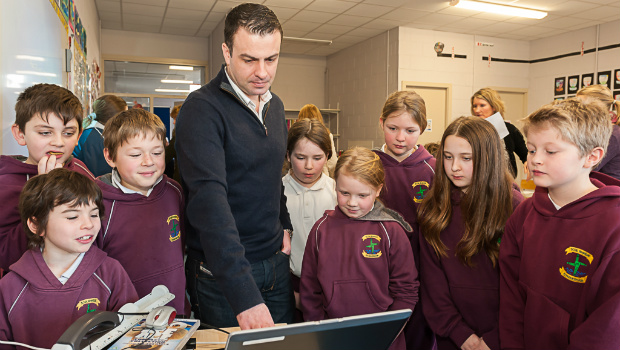The (ISC)² Foundation has marked Safer Internet Day 2014 by launching the its Safe and Secure Online programme in Ireland.
Safe and Secure Online volunteers – all (ISC)²-certified information security experts – visit schools across the country to talk about the most serious cyber risks faced by young people, including cyberbullying, online grooming and sexting.
Driven by the members of the (ISC)² Ireland Chapter, the programme boasts 20 volunteers who have reached over 1,000 children after a one-year pilot scheme.
“As a parent and a principal of a school, I know that we may think we understand what is going on, but we are not really aware of what our young children are doing on the Internet. I see they are going online, they are on Facebook and other sites, and I would say at least 60% of our juniour infant students received an iPad for Christmas. By the time they are 10 or 11-years-old, they are forming their habits and their online behaviour becomes a part of their culture. We therefore have a moral and educational responsibility to teach them how to behave properly and be safe while online,” said Kate Gallagher, principal of Scoil Bhride Athgarvan, The Curragh, which welcomed an (ISC)² volunteer to speak to students last Friday.
The Safe and Secure Online programme is a global initiative run by the (ISC)² Foundation, a charitable trust founded by (ISC)², the world’s largest not-for-profit body for information and software security professionals.
Programme materials include videos and activities that demonstrate risks to personal safety resulting from dangerous online habits and actions. Advice provided to children includes information on how to avoid identity theft; where to go for help when problems arise; and how to recognise dangers with common practices such as geo-tagging, managing passwords, safely downloading music, avoiding malicious traps, and interacting with others online.
In addition to the presentations, in-school surveys conducted by volunteers provide dynamic insight into children’s online behaviour and habits, while also ensuring materials are current. This data, revealing that almost 20% of 9- to 11-year-olds have met with someone in the real world they have previously talked to only online. Half of these children did so without taking anyone with them, whilst nearly 20% reported feeling personally uncomfortable or upset when chatting with an online contact they had never met in real life.
“This has become such an important issue for schools worldwide who embrace responsibility for ensuring the safety and ethical behaviour of their students. It’s essential that we make the effort to educate children early, and that we help adults understand how to keep everyone safe in our now very connected lives. Further, as children progress into the workforce, they will need a healthy respect for, and awareness of, the pitfalls that abound online,” said Julie Peeler, director (ISC)² Foundation.
TechCentral Reporters








Subscribers 0
Fans 0
Followers 0
Followers